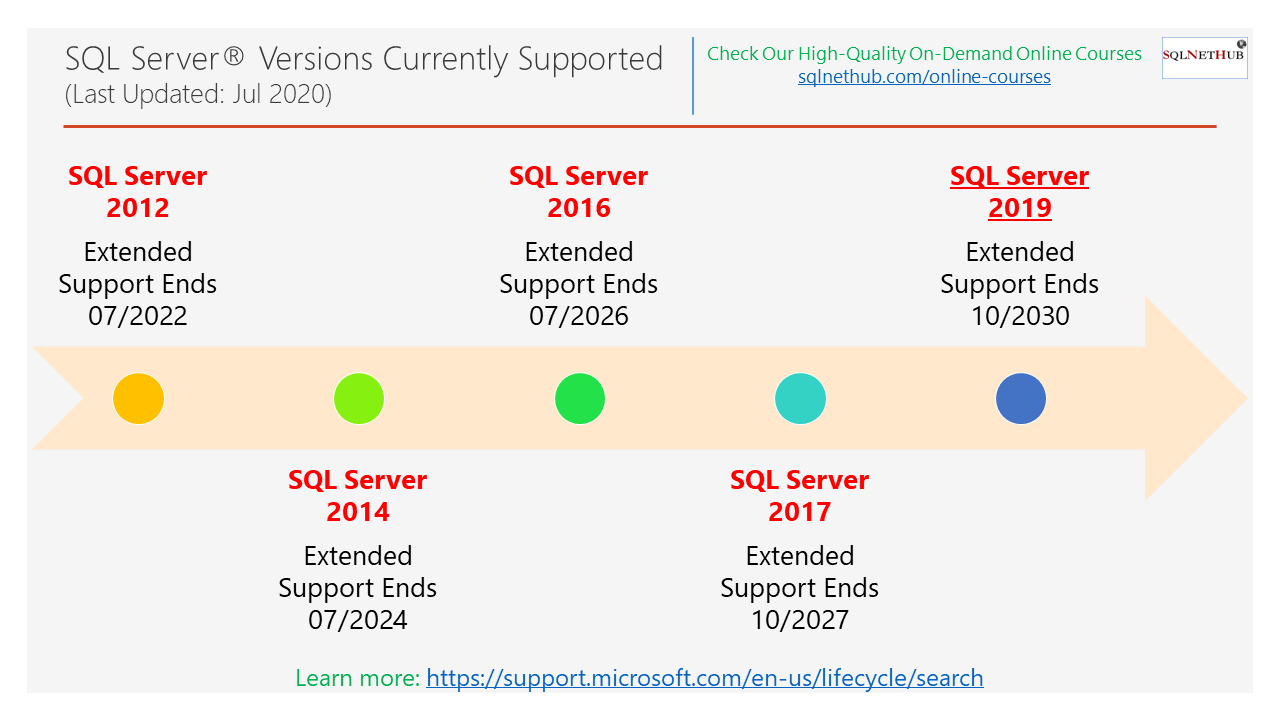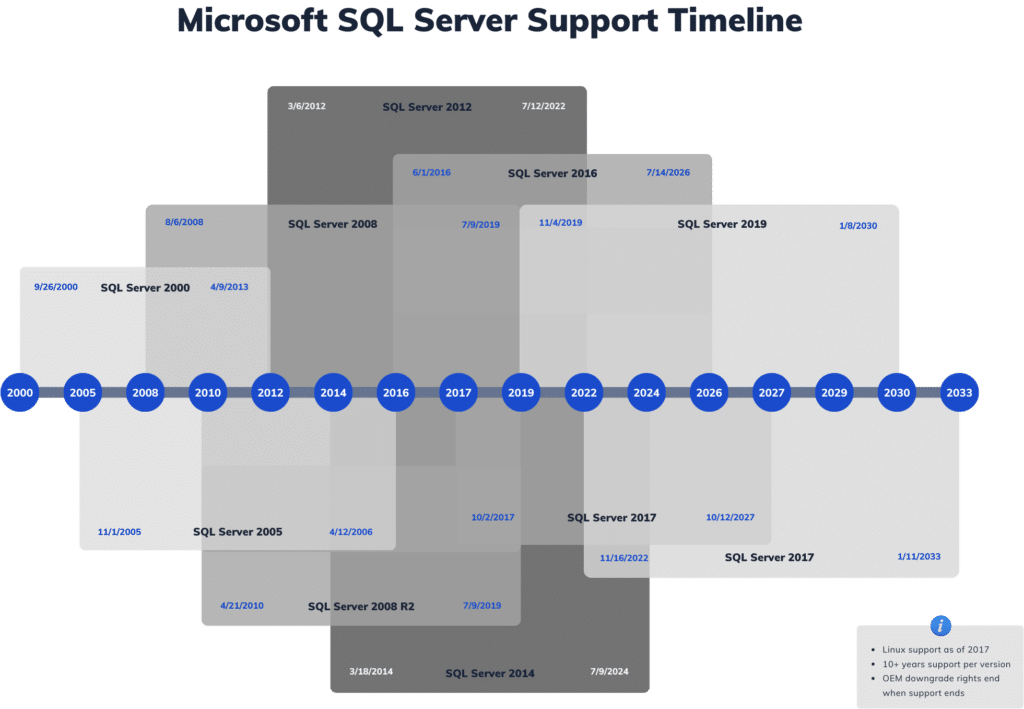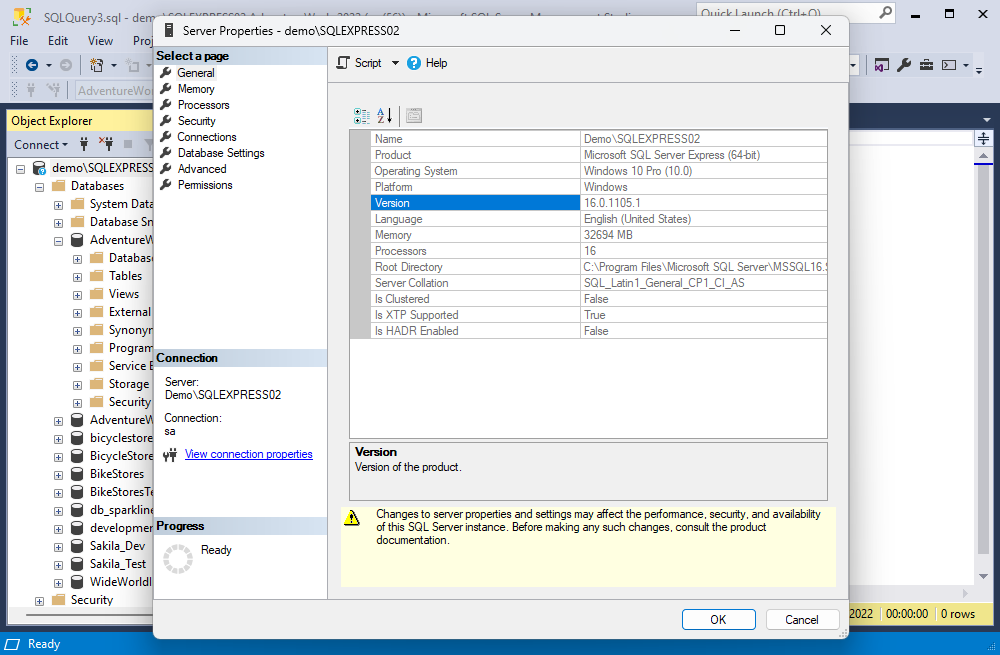There are five editions of SQL Server: Standard, Web, Enterprise, Developer, and Express. The main differences between the editions are listed below: Standard edition includes the core functionality required for most applications.Compare Different SQL editions and Different SQL Database Pricing
Enterprise
Web
Maximum memory for buffer pool
Maximum
64 GB
Maximum memory for Columnstore segment cache
Unlimited
16 GB
Maximum memory-optimized data size per database
Unlimited
16 GB
Maximum memory utilized per instance of Analysis Services
Maximum
N/A
If you are a developer or student who is learning SQL Server, or if you are building a small-scale application, then SQL Server Express is a good option. If you are a business that needs a full-featured database for production workloads, then SQL Server Standard is a better choice.
Can you have 2 versions of SQL Server : You can install multiple instances of SQL Server, or install SQL Server on a computer where earlier SQL Server versions are already installed.
Is every SQL the same
All SQL languages have the same basic structure as standard SQL. And for the most part, the key commands are the same or very similar. However, there are a few differences in the syntax across dialects. You can think of it somewhat like a natural language such as English.
What are the 5 types of SQL : These SQL commands are mainly categorized into five categories:
DDL – Data Definition Language.
DQL – Data Query Language.
DML – Data Manipulation Language.
DCL – Data Control Language.
TCL – Transaction Control Language.
However, new variations kept appearing as database implementers working at different vendors needed to solve new problems or circumvent already existing problems that were not addressed in the standard. This explains why a multiple of SQL dialects made their apparition and still co-exist today. C++ is often faster than PL/SQL; though generally harder to write. Again it comes down a lot to what you're doing; for most applications the complexity of using C/C++ over PL/SQL outweighs any performance benefits.
Which SQL is best for beginners
For beginners, it's recommended to start with a relational database management system (RDBMS). Two popular options are MySQL and PostgreSQL. MySQL is known for its simplicity and widespread adoption, while PostgreSQL offers advanced features and focuses on standards compliance.Yes, you can. SQL Server and MySQL can coexist as they are totally separate entities. By default, they will listen on different ports, they would work fine.SQL is primarily used to query and operate database systems. MySQL allows you to handle, store, modify and delete data and store data in an organized way. SQL does not support any connector. MySQL comes with an in-built tool known as MySQL Workbench that facilitates creating, designing, and building databases. So no, SQL is not dead, it has been used for over 50 years and will continue to be in demand for the foreseeable future.
Should I learn MySQL or PostgreSQL : PostgreSQL has improved performance for high-frequency write operations. MySQL is easier to get started with. It has a wider tool set for non-technical users. PostgreSQL is more complex to get started with.
Is SQL and MySQL same : What is the major difference between MySQL and SQL SQL is a query programming language for managing RDBMS. In contrast, MySQL is an RDBMS (Relational Database Management System) that employs SQL. So, the major difference between the two is that MySQL is software, but SQL is a database language.
Are all SQL softwares same
Every SQL system implements a slightly different version of SQL. There is a spec, but all of the systems deviate from it in various ways. If you have a remotely complex SQL codebase, you should not expect it to work without modification if you change your database management system. SQL is considered simpler to learn than Python since it only allows a limited number of operations; however, mastering its syntax and structures can take some time. On the other hand, Python has an extensive library, making it easier to code but it requires more time and effort to master than SQL.Performance. For simple queries and aggregations, SQL performs faster than Python because the data in the database already has a defined schema, and the computation process occurs close to the data. For Python, extraction of the data and loading must occur before data exploration, which may introduce latency.
Is SQL easier than Python : SQL is considered simpler to learn than Python since it only allows a limited number of operations; however, mastering its syntax and structures can take some time. On the other hand, Python has an extensive library, making it easier to code but it requires more time and effort to master than SQL.
Antwort Are there different versions of SQL? Weitere Antworten – How many versions of SQL are there
There are five editions of SQL Server: Standard, Web, Enterprise, Developer, and Express. The main differences between the editions are listed below: Standard edition includes the core functionality required for most applications.Compare Different SQL editions and Different SQL Database Pricing
If you are a developer or student who is learning SQL Server, or if you are building a small-scale application, then SQL Server Express is a good option. If you are a business that needs a full-featured database for production workloads, then SQL Server Standard is a better choice.

Can you have 2 versions of SQL Server : You can install multiple instances of SQL Server, or install SQL Server on a computer where earlier SQL Server versions are already installed.
Is every SQL the same
All SQL languages have the same basic structure as standard SQL. And for the most part, the key commands are the same or very similar. However, there are a few differences in the syntax across dialects. You can think of it somewhat like a natural language such as English.
What are the 5 types of SQL : These SQL commands are mainly categorized into five categories:
However, new variations kept appearing as database implementers working at different vendors needed to solve new problems or circumvent already existing problems that were not addressed in the standard. This explains why a multiple of SQL dialects made their apparition and still co-exist today.

C++ is often faster than PL/SQL; though generally harder to write. Again it comes down a lot to what you're doing; for most applications the complexity of using C/C++ over PL/SQL outweighs any performance benefits.
Which SQL is best for beginners
For beginners, it's recommended to start with a relational database management system (RDBMS). Two popular options are MySQL and PostgreSQL. MySQL is known for its simplicity and widespread adoption, while PostgreSQL offers advanced features and focuses on standards compliance.Yes, you can. SQL Server and MySQL can coexist as they are totally separate entities. By default, they will listen on different ports, they would work fine.SQL is primarily used to query and operate database systems. MySQL allows you to handle, store, modify and delete data and store data in an organized way. SQL does not support any connector. MySQL comes with an in-built tool known as MySQL Workbench that facilitates creating, designing, and building databases.

So no, SQL is not dead, it has been used for over 50 years and will continue to be in demand for the foreseeable future.
Should I learn MySQL or PostgreSQL : PostgreSQL has improved performance for high-frequency write operations. MySQL is easier to get started with. It has a wider tool set for non-technical users. PostgreSQL is more complex to get started with.
Is SQL and MySQL same : What is the major difference between MySQL and SQL SQL is a query programming language for managing RDBMS. In contrast, MySQL is an RDBMS (Relational Database Management System) that employs SQL. So, the major difference between the two is that MySQL is software, but SQL is a database language.
Are all SQL softwares same
Every SQL system implements a slightly different version of SQL. There is a spec, but all of the systems deviate from it in various ways. If you have a remotely complex SQL codebase, you should not expect it to work without modification if you change your database management system.

SQL is considered simpler to learn than Python since it only allows a limited number of operations; however, mastering its syntax and structures can take some time. On the other hand, Python has an extensive library, making it easier to code but it requires more time and effort to master than SQL.Performance. For simple queries and aggregations, SQL performs faster than Python because the data in the database already has a defined schema, and the computation process occurs close to the data. For Python, extraction of the data and loading must occur before data exploration, which may introduce latency.
Is SQL easier than Python : SQL is considered simpler to learn than Python since it only allows a limited number of operations; however, mastering its syntax and structures can take some time. On the other hand, Python has an extensive library, making it easier to code but it requires more time and effort to master than SQL.